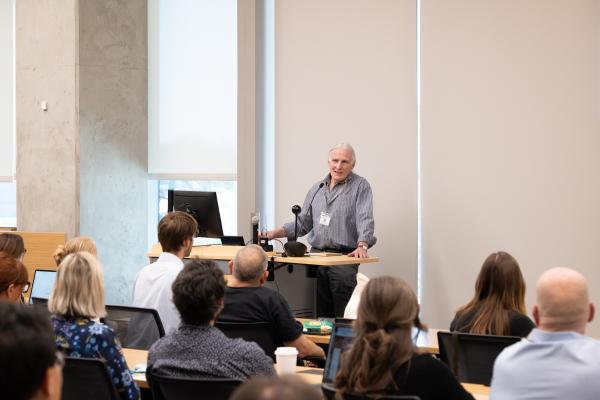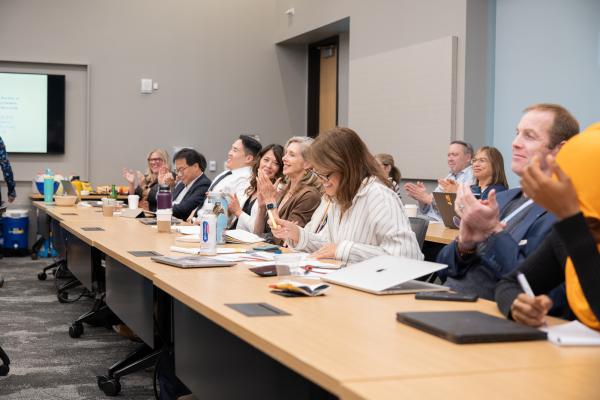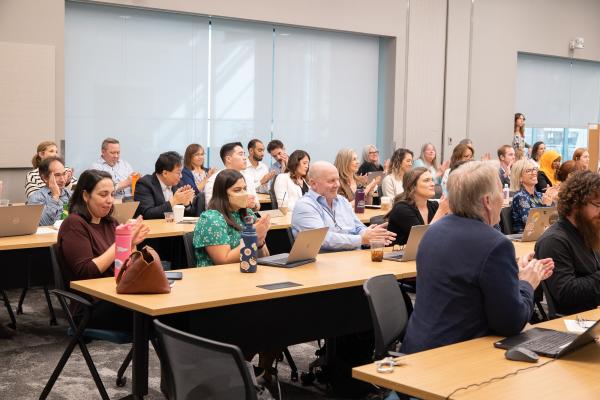
Learn More: CU Denver Center for Psychedelic Research
In a moment that brought together scientists and educators from across Colorado, the CU Psychedelics Summit marked a milestone in the state's leadership in psychedelic research and education.
Hosted by CU Anschutz and featuring contributions from every campus in the CU System, the one-day summit reflected the energy and expertise that's making Colorado a national model for safe and effective psychedelic research.
"It was great to bring together people from across the University of Colorado system and share our range of work advancing the safe and effective use of psychedelics," said Scott Thompson, professor of psychiatry at CU Anschutz and one of the event's organizers. "Our contributions are greater than the sum of our individual parts, and Colorado is leading the way forward."
That collaborative spirit defines CU Denver's work in this field. Through the Center for Psychedelic Research—launched in 2024 under the leadership of Dr. Jim Grigsby, professor of psychology and neuroscience—CU Denver is expanding the boundaries of mental health science and training the next generation of facilitators and clinicians to ensure these therapies are delivered safely and equitably.
Building a Statewide Psychedelic Research Community
The summit opened with remarks from Thompson who emphasized the importance of uniting researchers across campuses. "I want us to be recognized as a community," he said, "so that when the public and policymakers are looking for scientific and medical advice, they have a place to come to."
Thompson described the newly formed Psychedelic Research Consortium as a "big tent"— a clearinghouse for expertise and information across Colorado's universities. His own work in the Laboratory of Translational Psychiatry explores the neurobiology of depression and how compounds like psilocybin may restore healthy brain communication. "We've shown that psilocybin can restore excitatory synaptic transmission and reward behavior," he explained, referencing his team's ongoing studies linking psychedelics to dopamine signaling and emotional recovery.
He also shared early safety data on microdosing, showing that low-dose psychedelics did not cause heart damage in mice - an important reassurance as public interest in microdosing grows. "Insofar as you can go from mouse to human," Thompson noted, "microdosing appears safe in that regard."
For Thompson, such research isn't just laboratory science; it's public service. His collaborations with state agencies and the Psychedelic Public Policy Partnership have already informed Colorado's rollout of the Natural Medicine Health Act, helping ensure that new therapeutic pathways are grounded in rigorous evidence.
An Afternoon of Momentum Building
The summit's full-afternoon agenda captured the momentum of psychedelic science unfolding across Colorado, featuring faculty from all four CU campuses and universities statewide, sharing updates that ranged from psilocybin's effects on depression and MDMA-assisted therapy to the neuroscience of motivation and the policy frameworks guiding safe, ethical access.
Other talks highlighted topics such as harm reduction, Indigenous healing traditions, and culturally responsive care under Colorado's Natural Medicine Health Act, demonstrating how science and community expertise are shaping a shared future for this emerging field.
The day closed with a poster session and networking reception that brought together students, faculty, and community partners to celebrate discovery in motion. Poster presentations covered everything from neurobiological mechanisms and therapeutic safety to public health, ethics, and social equity in psychedelic practice.
For many students, it was a chance to "meet their moment"— sharing ideas, forging collaborations, and envisioning how their work can make a real-world difference. The energy in the room made it clear: this is not just a new area of study; it's a growing, connected community defining what responsible psychedelic research in Colorado can look like.
From Vision to Reality: CU Denver's Center for Psychedelic Research
 Following Thompson's introduction, Dr. Jim Grigsby outlined the story behind CU Denver's Center for Psychedelic Research— an effort more than a decade in the making. "What I'm going to do today," Grigsby began with a smile, "is try to talk about seven years of work in about eight minutes."
Following Thompson's introduction, Dr. Jim Grigsby outlined the story behind CU Denver's Center for Psychedelic Research— an effort more than a decade in the making. "What I'm going to do today," Grigsby began with a smile, "is try to talk about seven years of work in about eight minutes."
Grigsby first became involved in psychedelic research in 2011 through a MAPS-funded clinical trial on MDMA-assisted therapy for PTSD. That experience, he said, sparked a long-term interest in the mechanisms by which psychedelics might reshape the brain's emotional pathways. Collaborations with colleagues at CU Denver, CU Boulder, and CU Anschutz soon followed, culminating in a National Cancer Institute grant studying psilocybin in palliative care.
The Center officially launched in 2024, marking CU Denver as the first campus in the CU System to establish a dedicated hub for psychedelic research and education. "We want to be able to provide data to make the case that psychedelic therapy is a cost-effective form of mental health treatment," Grigsby said— a pragmatic goal that blends science, compassion, and public accountability.
Training the Next Generation: Education and Access
 If Grigsby's presentation underscored the Center's research strength, Dr. Vivian Shyu, Director of Education and Training, highlighted its equally vital educational mission. Her program—approved by the state in 2024— is the first university-affiliated psychedelic facilitator training program in Colorado leading to state licensure.
If Grigsby's presentation underscored the Center's research strength, Dr. Vivian Shyu, Director of Education and Training, highlighted its equally vital educational mission. Her program—approved by the state in 2024— is the first university-affiliated psychedelic facilitator training program in Colorado leading to state licensure.
Shyu's remarks reflected both accomplishment and humility. "Class just started on Monday," she told attendees with a laugh. "I'm very tired, but I'm so excited to be here."
Her 16-week hybrid curriculum prepares students to become licensed facilitators within Colorado's regulated psychedelic services framework, emphasizing ethics, safety, and presence. "Ethical integrity was one of the first things that really drove me," Shyu said. "If we're going to bring these practices to a larger swath of the public, we've got to err on the side of doing it carefully and safely - and hopefully slowly."
"If we're going to bring these practices to a larger swath of the public, we've got to err on the side of doing it carefully and safely - and hopefully slowly."
The program blends didactic coursework with practicums at vetted centers, integrating both clinical and non-clinical tracks. Shyu emphasized that the university context brings rigor and accessibility to the field. "Because we're part of the university," she noted, "we can lean more toward an academic presentation— bringing in more science and evidence-based material."
Her approach resonates with CU Denver's core values of accessibility, innovation, and real-world relevance. As part of the College of Liberal Arts and Sciences, the training program bridges disciplines—from psychology to ethics, neuroscience to community health—positioning CU Denver as both educator and ethical guide in a rapidly evolving field.
A Broader Lens on Psychedelics and Society
Among the day's diverse presentations, CU Denver faculty member Dr. Marty Otanez brought a cultural and social lens to the conversation, exploring community narratives around psychedelics and the importance of equitable access. While not formally part of the Center for Psychedelic Research, Otanez's work illustrates the breadth of CU Denver's engagement— from lab-based inquiry to community-based understanding— and reflects the university's commitment to inclusive, human-centered scholarship.
Colorado's Next Chapter in Psychedelic Science
The CU Psychedelics Summit was more than a meeting - it was a moment. It affirmed that Colorado's universities are not just studying psychedelics; they're shaping how this field will evolve. For CU Denver, that means pairing rigorous research with compassionate education, guided by evidence and ethics.
As Grigsby's center grows and Shyu's trainees enter the workforce, CU Denver's impact will ripple across the state and beyond - influencing public policy, clinical practice, and cultural understanding.
In the words of Scott Thompson, "Our contributions are greater than the sum of our individual parts." At CU Denver, those parts are coming together - in labs, classrooms, and communities - to ensure that psychedelic research in Colorado is grounded, inclusive, and transformative.



Full Agenda
PRESENTATIONS
Translational Studies of Psychedelics: Mice, Men, and Public Policy - Scott Thompson, PhD, Professor, Department of Psychiatry, CU Anshutz (scott.m.thompson@cuanschutz.edu
Introduction to the CU Psychedelic Research Center - Jim Grigsby, PhD, Professor, Department of Psychology, CU Denver (jim.grigsby@ucdenver.edu)
The Regulatory Hurdles of Conducting Psychedelic Research at CU Anschutz - Andy Novick, MD, PhD, Assistant Professor, Department of Psychiatry, CU Anschutz (andrew.m.novick@cuanschutz.edu)
Reunion Postpartum Depression Study - Camille Hoffman, MD, Professor and Fellowship Program Director, Vice Chair of Faculty Wellness, Division of Maternal Fetal Medicine, Dept of Obstetrics & Gynecology and Psychiatry, CU Anschutz (camille.hoffman-shuler@cuanschutz.edu)
INSPIRE Consortium: A Psychedelic Consortium focused on Older Adults - Stacy Fischer, MD, Professor – Medicine-Internal Medicine, Co-Program Leader, Cancer Prevention and Control, University of Colorado Cancer Center, CU Anschutz (stacy.fischer@cuanschutz.edu)
Effects of an International Ceremonial Ayahuasca Retreat on the Diversity and Community Composition of the Gut Microbiome in United States Veterans - Christopher Lowry, Professor, Department of Integrative Physiology, CU Boulder (christopher.lowry@colorado.edu
BIPOC and Low-Income Individuals as Citizen Scientists: An Exploratory Qualitative and Video-Based Study - Marty Otañez, PhD, Associate Professor, Anthropology Department, CU Denver (marty.otanez@ucdenver.edu)
Anticipating the Public Health Challenges of Increasing Psilocybin Use: Potency Profiles and Acute Effects from Colorado Mushrooms - Kent Hutchiston, PhD, Professor of Psychiatry, CU Anschutz (kent.hutchison@cuanschutz.edu)
A Surveillance Mosaic for Psychedelic Drug Monitoring - Andrew Monte, MD, PhD, Professor of Emergency Medicine & Medical Toxicology, University of Colorado School of Medicine & Associate Director Rocky Mountain Poison & Drug Safety, Denver Health (andrew.monte@cuanschutz.edu)
The CU Denver Center for Psychedelic Research Facilitator Training Program - Vivian Shyu, PhD, Director of Education and Training/Teaching Professor, CU Denver (vivian.shyu@ucdenver.edu)
Rewiring the Adolescent Prefrontal Cortex: Psilocybin and Excitation-Inhibition Balance - Won Chan Oh, PhD, Associate Professor, Pharmacology Department, CU Anschutz (wonchan.oh@cuanschutz.edu)
Sex-Specific Effects of Psilocin on Fentanyl-Seeking Behavior in Mice - Ana Clara Bobadilla, Ph.D. Assistant Professor of Neuroscience, Colorado State University (ac.bobadilla@colostate.edu)
Ketamine Reverses Chronic Stress-Induced Behavioral Changes via the Expression of Ca2+-Permeable AMPA Receptors in Mice - Seonil Kim, PhD, Associate Professor, Dept of Biomedical Sciences, Colorado State University (seonil.kim@colostate.edu)
POSTER PRESENTATIONS
Sleep Quality and Inflammation as Mechanisms Underlying Trauma Symptom Improvement Following Complementary and Integrative Psychedelic-Assisted Retreat Programs - Nate Anderson, PhD Student, Department of Integrative Physiology, CU Boulder (nathan.d.anderson@colorado.edu)\
Couples Therapy and Psychedelics - Beth Allen, PhD, Professor, Department of Psychology, CU Denver (elizabeth.allen@ucdenver.edu)
Psychedelics in the Fire Service: Understanding the Policy Environment and Firefighter Preferences in Colorado - Rachel Topazian, PhD, Assistant Professor, University of Colorado Center for Bioethics and Humanities (rachel.topazian@cuanschutz.edu); Michael DiStefano, PhD, Assistant Professor, University of Colorado School of Pharmacy (michael.j.distefano@cuanschutz.edu)
Perceptions Towards Psilocybin and Psilocybin-Assisted Psychotherapy in a Sample of Older Adult Black Cancer Patients and Survivors Across Colorado and Missouri (In Planning) - David Bradford, Clinical Health Psychology PhD Student, CU Denver (david.bradford@ucdenver.edu)
Loss of Meaning as a Central Treatment Target in Psilocybin-Assisted Psychotherapy for Advanced Cancer Distress: An Exploratory Network Analysis - Austin J. Mallard, B.A., Doctoral Student in Clinical Health Psychology, CU Denver (austin.mallard@ucdenver.edu)
The Self in Psychedelic Assisted Psychotherapy - Shandra Brown Levey, Kristin Kilbourn & Jim Grigsby, CU Denver (shandra.brownlevey@cuanschutz.edu; kristin.kilbourn@ucdenver.edu)
Overview of our RCT Study- Descriptives - Cate Pappano, Austin Mallard et al. (PI: Stacy Fischer) (cate.pappano@ucdenver.edu)
Overview of our PAP Process for the Advanced Cancer Psilocybin RCT - Kristin Kilbourn & Shandra Brown Levey (PI: Stacy Fischer) (shandra.brownlevey@cuanschutz.edu; kristin.kilbourn@ucdenver.edu)
The Impact of Decriminalization of Psychedelics on Use, Mental Health and Criminal Activity - Laura M. Argys, Professor of Economics, CU Denver; Vivian Shyu, Teaching Professor, Psychology, CU Denver; Isabel Wolf, Economics undergraduate student, CU Denver (laura.argys@ucdenver.edu; vivian.shyu@ucdenver.edu; isabel.wolf@ucdenver.edu)
Increased Levels of the Schizophrenia-Associated Gene C4 Disrupt Psychedelic-Induced Remodeling of L1 Apical Tufts in the Prefrontal Cortex - Alberto Cruz-Martín, Associate Professor, Anesthesiology Department, CU Anschutz (alberto.cruzmartin@cuanschutz.edu)
Ketamine Reverses Chronic Stress-Induced Behavioral Changes via the Expression of Ca2+-Permeable AMPA Receptors in Mice - Seonil Kim, PhD, Associate Professor, Dept of Biomedical Sciences, Colorado State University (seonil.kim@colostate.edu)
Mechanistic Studies of Psychedelics: Reward, Stress, and Cardiovascular Outcomes - Devin Effinger, PhD, Postdoctoral Fellow, Dept. of Psychiatry, CU Anschutz (devin.effinger@cuanschutz.edu)
A Medical and Visual Anthropology Approach to Fungi Medicine: Notes on the CU Denver Psilocybin Study - CU Denver Undergraduate Student (Psychology): Arthur Mason; CU Denver Masters Student (Medical Anthropology): Abby Brauns; CU Denver Doctoral Student (Psychology): David Bradford; CU Colorado Springs Undergraduate Student (Social Work): Lina La Cerva; CU Anschutz Clinical Research Coordinator (Psychiatry: Jordyn Johnson; CU Boulder Doctoral Student (Anthropology): Kelsey Armeni (Marty Otanez, Associate Professor in Anthropology, CU Denver, PI) (marty.otanez@ucdenver.edu)
